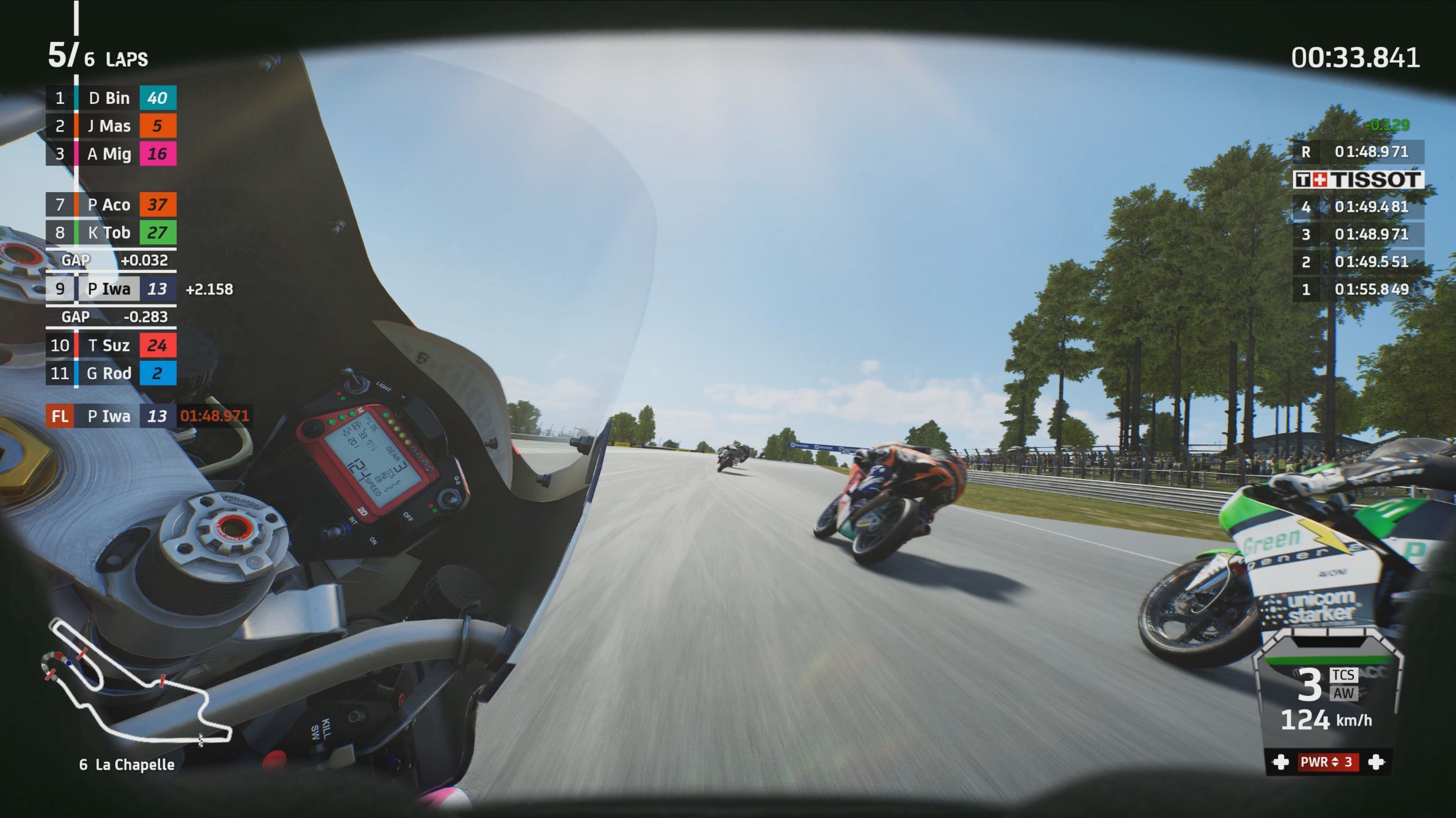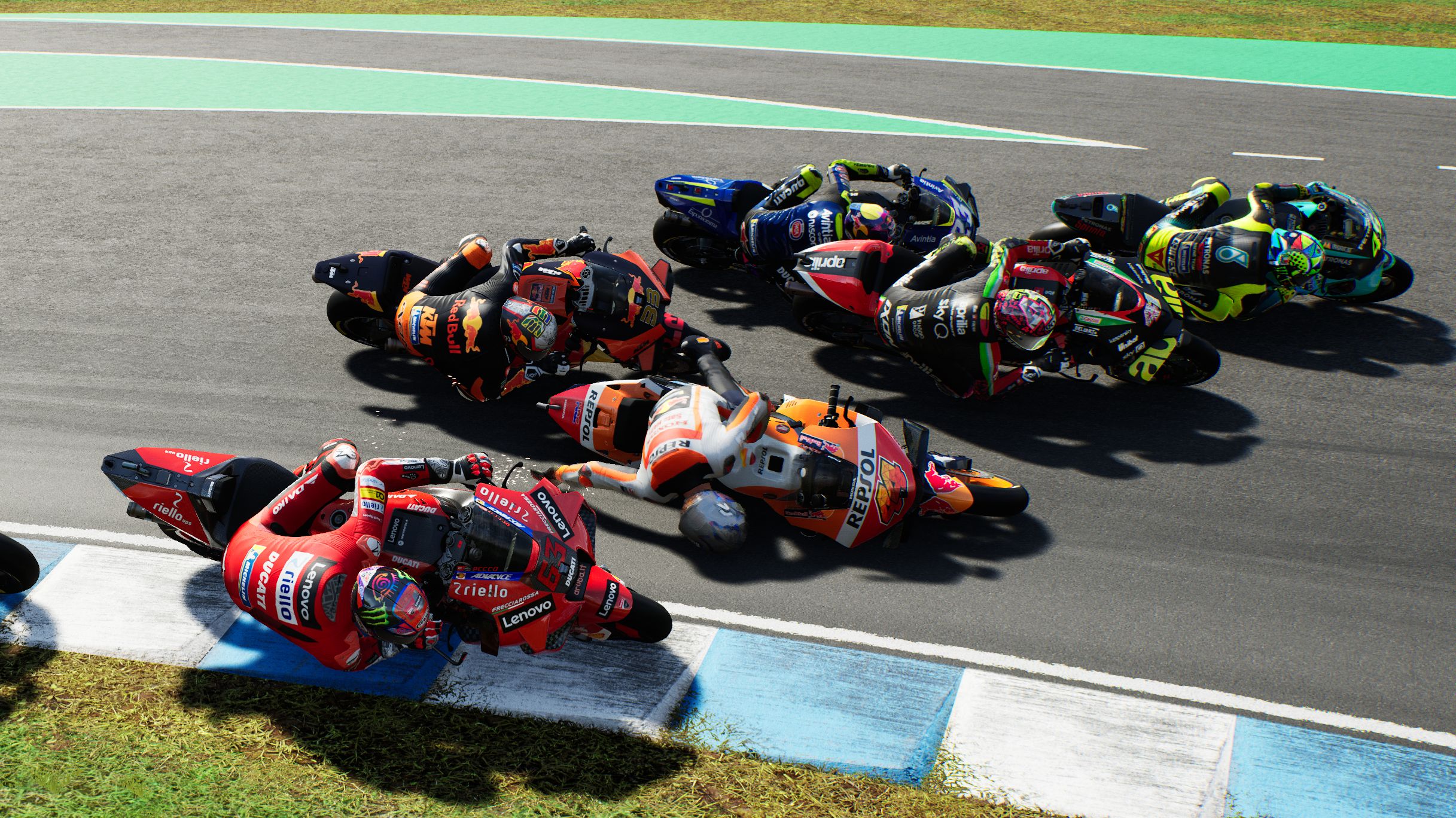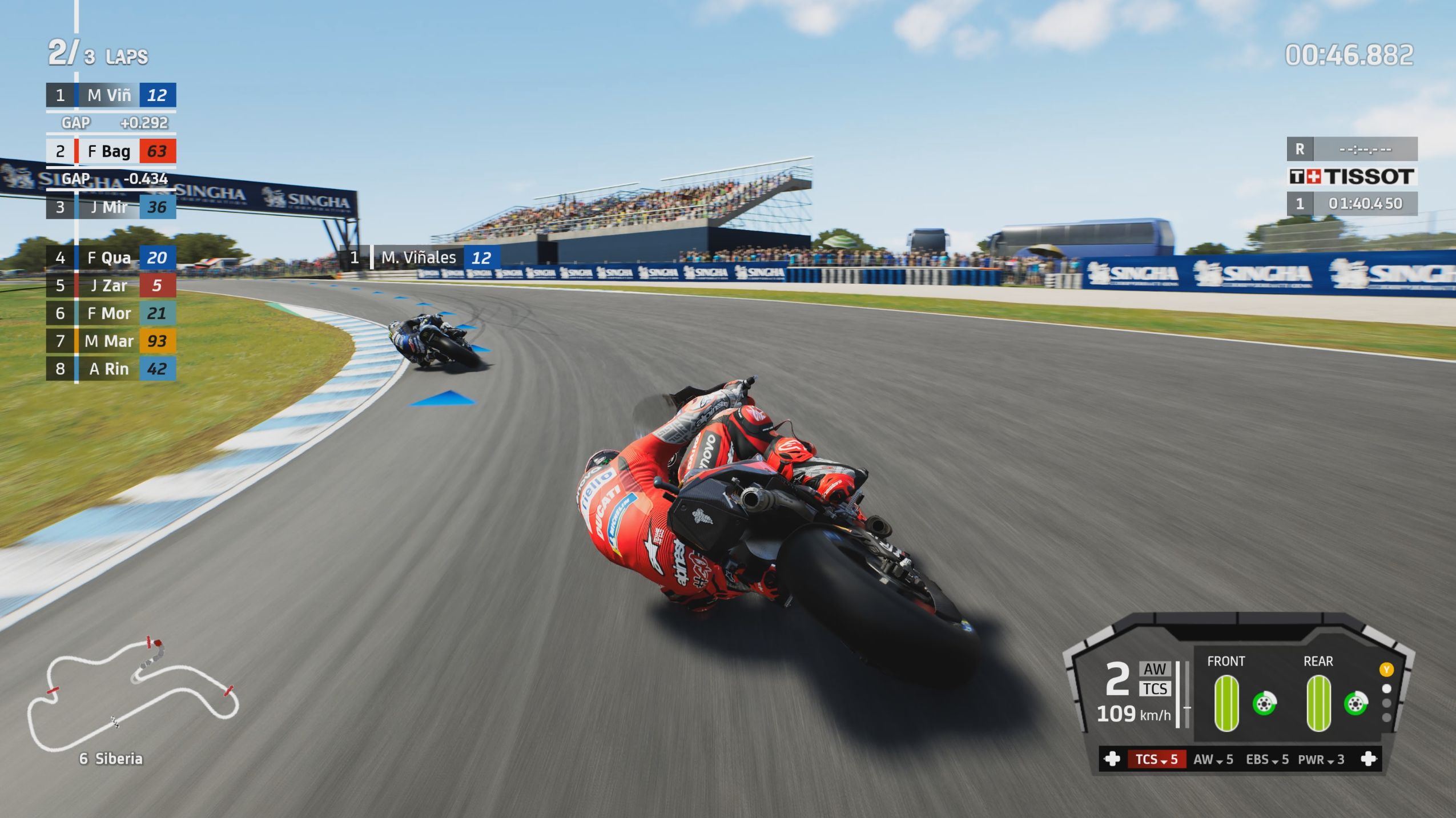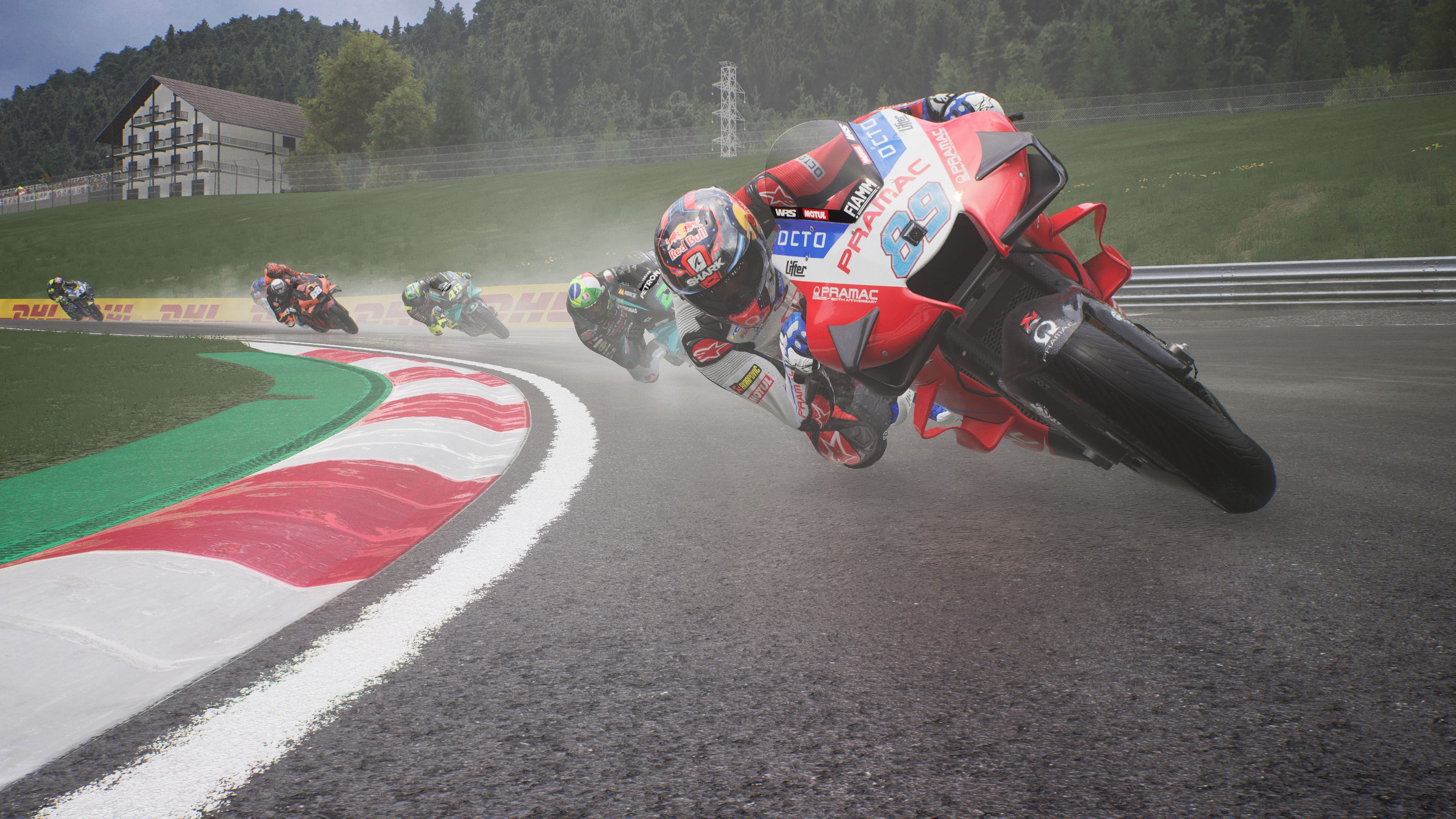Our Verdict
Wobbly and unstable in all the right ways, and some of the wrong ones too.
PC Gamer's got your back
What is it? A racing sim carrying the official MotoGP license.
Expect to pay $50/£40
Developer Milestone Interactive
Publisher Milestone Interactive
Reviewed on I7 9700K, RTX 2080 TI, 16GB RAM, Windows 10
Multiplayer? Up to 22 players
Link Official site
Are you new to motorcycle racing games? Well let me tell you this: MotoGP 21 is going to be really, really difficult. But what am I saying—maybe you're a perennial hundred-hour player in Milestone's long-running bike sim, with every braking zone from Losail turn one to Valencia's Adrian Campos corner memorised. Guess what: MotoGP 21 is still going to be really, really difficult.
This series has turned adamantly sim-wards since its move to Unreal Engine in 2018, but this year's release represents the most noticeable shift in difficulty and realism in years. In particular, changes to suspension and braking make themselves felt in every corner entry and apex, demanding a different approach than last year's game asked of you. And if you didn't play last year's game: oh boy. You're going to be spending some time in the tutorial. One which is pretty comprehensive this year, perhaps not by coincidence.
In fairly dry but informative lap sector challenges, you're introduced to the various assists and encouraged to try racing with and without them, before graduating to fiddlier aspects like manual electronics management, tyre wear, brake temps and overtaking without killing yourself, several other riders, and any number of spectators. I'm still working on that one myself.

But let's zoom out a bit, because being a modern licensed racing game, there are depths to plumb here that extend way beyond the MotoGP and its associated circuits. MotoGP 21's main offering is a career mode in which your custom rider graduates from Moto3 through Moto2 and finally to the big leagues—or just picks a ride in the fastest category as a rookie, your call.
In any event, you're given RPG-like levels of control over your team, earning upgrade points by ticking off objectives in practice sessions and then spending them on bike development. This time you're even assigning specific members of staff to each upgrade project based on their specialisms.
All that inter-team tweaking can be rewarding over the long term, particularly if you take MotoGP 21 up on its offer to run a completely new team from scratch (which also lets you design a custom livery in any number of sickening colour combinations). There's not enough here alone to prevent annualised release cadence fatigue, though. That's where the on-track changes come in. However good you were at MotoGP 20, you're going to have to completely revise your braking technique here, because the physics changes have a profound effect in those few hundred meters before the apex. It's controller-smashingly easy to apply too much front brake pressure and tip your weight too far forwards, ending up in either a stoppie or a lock-up that sends you sailing past the racing line.

The feeling and timing of shifting your rider's weight from one side of the bike to the other is slower, more precarious, and ultimately more believable now, too. And when those two new facets of the handling are combined, MotoGP 21 asks you to think one turn ahead, in a very real sense. On MotoGP bikes especially, which eat up ground like Mukbang streamers at a Yo Sushi, you need to set the angle and speed of your bike quite a few seconds before the corner looms large or you'll never get it leaned over and slowed down in time.
However good you were at MotoGP 20, you're going to have to completely revise your braking technique here.
The frustration is real, then, but the rewards are plentiful. For anyone who cared about realism in the pre-Unreal Engine MotoGPs, the ability to constantly tweak your speed and trajectory with taps of the brake or throttle were an immersion killer. The last few games have been working up to a handling model which demands you pick a line and either stick with it or upset your bike, and this year Milestone, quite assertively, achieves it.
It's particularly enjoyable in Moto3, where the slower bikes lavish in a well-set line and your poor overstimulated brain gets a second to register that "hey, I've nailed this corner". As you progress to faster hardware, the corners are gone by the time you enter them, although MotoGP class braking zone battles are something to behold now. There's a lot of time to be made up on the AI with effective braking technique, so fortune favours those with a deft touch on the LT and A buttons (with the assists off, you control front and rear brakes independently).

But there's trouble in this paradise of two-wheeled poise and balletic gliding from apex to apex. That trouble takes its most noticeable form in the AI riders, who employ some very odd tactics including but not limited to: constantly wiggling very slightly from side to side on straights, crashing 90% of the time in a particular turn at Assen, and never, ever taking a long lap penalty. They also reset to the track straight after crashing, so if you have the new bike recovery mechanic enabled, you'll spend 10 seconds running your rider over to his bike and picking it back up while any other fallers are already three turns up the road.
Something's changed in the lighting, too, which makes this year's game appear flatter and duller than the last, while the tyre spray from wet races has a distracting flicker. Admittedly MotoGP 19 had some pretty gnarly whiteouts during sunny races, so it's nice to see those retina-destroying moments are gone, but in its quest for a more realistic look MotoGP 21's lightning sucks some life out of the environments.
You should buy MotoGP 21 anyway, though, if you have even a sliver of interest in the exploits of Quartararo, Mir, Vinales, Rossi and the gang. Its meaty career mode can hold you for months, and the uncompromising handling model holds a fascination all of its own.
Wobbly and unstable in all the right ways, and some of the wrong ones too.
Phil 'the face' Iwaniuk used to work in magazines. Now he wanders the earth, stopping passers-by to tell them about PC games he remembers from 1998 until their polite smiles turn cold. He also makes ads. Veteran hardware smasher and game botherer of PC Format, Official PlayStation Magazine, PCGamesN, Guardian, Eurogamer, IGN, VG247, and What Gramophone? He won an award once, but he doesn't like to go on about it.
You can get rid of 'the face' bit if you like.
No -Ed.



